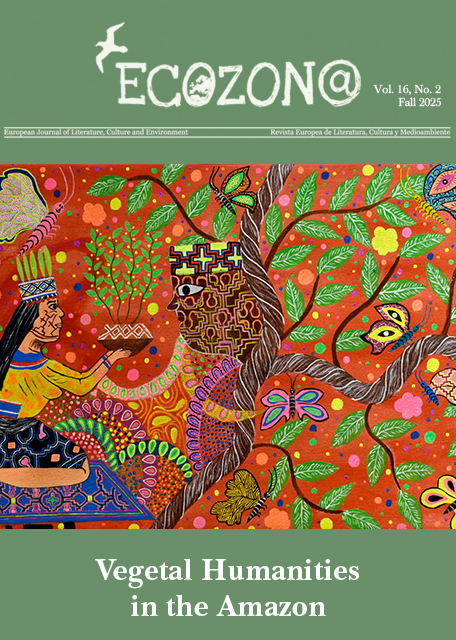Sensing Scale in Experimental Gardens: Un-Lawning with Silphium Civic Science
DOI:
https://doi.org/10.37536/ECOZONA.2023.14.1.4831Parole chiave:
civic science, garden, plants, scale framing, storyAbstract
Gardening experiments are timely in the context of what many now call the Anthropocene, an era that highlights questions of how humans collectively relate to the larger Earth systems in which we are embedded. In Ecocriticism on the Edge: The Anthropocene as a Threshold Concept, Timothy Clark reflects on the “unreadability” of the Anthropocene. He invites ecocritics to address this challenge by practicing “scale framing,” reading texts in variable and increasingly broad scales, and engaging the contradictions that emerge. We applied a scale framing approach to a story of relationships with Silphium integrifolium in an experimental gardening project. Silphium is a native North American perennial prairie plant being domesticated as a future oilseed crop. We are researchers and participants in a civic science project, in which individual garden sites are designed to collect data on and conserve silphium ecotypes while being linked into a wider network. In particular, we analyzed a civic science video story created by Ellie Irons called “Un-Lawning with Silphium.” Through our ecocritical analysis, we generated a framework to visualize nested and cross-scalar relationships in gardening projects. This framework could help inform the design and assessment of experimental gardening projects that feature the arts and humanities (e.g., digital narratives, ecocriticism, and pedagogy) and connect them with the natural and social sciences (e.g., plant breeding, botany, geography, and ecology) through transdisciplinary and participatory research methodologies for public engagement (e.g., civic science). We found that civic science gardening with silphium, and other gardening experiments in the Anthropocene, can guide public sensory engagements with scale, help spark recognition and investigation of contradictory scale effects, and motivate us to imagine and build relationships of caring responsibility.
Downloads
##submission.additionalFiles##
Pubblicato
Fascicolo
Sezione
Licenza
Authors who publish with this journal agree to the following terms:
a) Authors retain copyright and grant the journal right of first publication with the work simultaneously licensed under a Creative Commons Attribution License that allows others to share the work with an acknowledgement of the work's authorship and initial publication in this journal (CC BY-NC for articles and CC BY-NC-ND for creative work, unless author requests otherwise.
b) Authors are able to enter into separate, additional contractual arrangements for the non-exclusive distribution of the journal's published version of the work (e.g., post it to an institutional repository or publish it in a book), with an acknowledgement of its initial publication in this journal.
c) Authors are permitted and encouraged to post their work online (e.g., in institutional repositories or on their website) prior to and during the submission process, as it can lead to productive exchanges, as well as earlier and greater citation of published work (See The Effect of Open Access).










